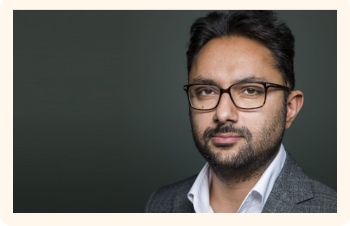South Korean survival horror show Squid Game captivated audiences worldwide on its release back in 2021, featuring a dramatic contest between regular people it felt ready to be adapted for reality TV. Fast forward to 2023 when Studio Lambert brought the idea to life with Squid Game: The Challenge, featuring the largest cast in reality TV history and a record-breaking single cash prize of $4.56 million USD (now showing on Netflix).
At the Creative Access masterclass in December 2024, we heard from experts at Studio Lambert, the very production company that had a hand in its making. The panel shared what it took to bring Squid Game: The Challenge to the screen, insights about working in unscripted TV, and nuggets of wisdom from their own career journeys so far.

Who are the panel and what do they do?
- Stephen Yemoh, executive producer: Responsible for overseeing the creative vision, from selecting games to driving casting decisions.
- Anna Wood, line producer: Managing logistics, ensuring that over 800 crew members and nearly 500 contestants were housed, fed & moved safely across the sprawling set.
- Esme Holliday, games researcher: Designing and testing games that would balance playability with visual and dramatic impact.
Stephen YemohDon’t fear hearing ‘no.’ It’s rarely personal, and often just a matter of timing.
Adapting a cultural phenomenon
Bringing the tension and drama of Squid Game to reality TV is no mean feat. Executive producer Stephen nicely summed up the production’s all-in approach when it came to staying true to the original: “Be bold. Don’t try and cheapen it; do everything you can to make it feel exactly like what people have seen in the drama.”
In practice, this meant implementing an incredible level of attention to detail across all elements of production. Games researcher Esme remembers this forensic creative process well: “We counted thousands of marbles used in one of the games to ensure consistency. “We tested cookies to make sure they were the right level of brittle and would stay that way over the day.” In terms of designing games, there was a level of direction from the drama’s visuals, but a core focus of Esme’s role was to make these into fair and entertaining games that people could actually play. On two occasions they ran games tests with 456 supporting artists!
The ‘squid’ technology (a pun on the usual ‘squibs’ designed to imitate blood) that provided a clear visual cue for when contestants were eliminated was another element that had to be iterated again and again. The nozzle designed to deliver the ink was redesigned at least thirty times before it behaved exactly as needed on set. Even choosing t-shirts that the ink would easily show through was essential in making this element look right. Stephen points out that the ‘squid technology’ was one of the many things that made the drama feel real for contestants, a key part of creating highly watchable reality TV. Unlike their actor counterparts in the drama, contestants reacted with shock to eliminations because of a sudden effect, versus post-production VFX added after in the editing suite.
Esme spoke about both intense pressure and memorable fun moments on the show, like adjudicating the Red Light, Green Light game: “I remember telling creative director Tim Harcourt and Stephen Lambert himself to be quiet when we were doing Red Light, Green Light because I was logging eliminations from the game in real time which production were then using to book people’s flights home! I said, everyone in this room please be quiet, I’m trying to concentrate! Of course, not realising our creative director and owner of the company were behind me.”
Esme HollidayI’ve done eight researcher jobs now, and every one taught me something different. Keep sending your CV out, take opportunities, and nestle into companies that help you grow.
The career paths behind the Studio Lambert staff
The masterclass underscored how varied and unconventional career paths can lead to TV. Anna Wood was candid about sharing her snakes and ladders career path prior to TV: “I’ve had six jobs before TV – from hospitality to corporate work – but every experience taught me something useful.” Starting later than many of her peers, she leveraged her transferable skills to build a successful career.
Esme echoed this adaptability, describing her early roles in production: “I’ve done eight researcher jobs now, and every one taught me something different. Keep sending your CV out, take opportunities, and nestle into companies that help you grow.” Esme grew up in a tiny village in Cumbria and always knew she wanted to work in media but didn’t always know what that meant. Now she feels like she’s done almost every role there is to do at Studio Lambert.
For executive producer Stephen, TV started with a dream of becoming a footballer as a younger teenager. After it was clear his talents on the pitch wouldn’t give him his career, he started thinking: why not work on football instead? He was at a Sky Sports live recording where someone on the production team joked to the audience that “we’ll get the work experience to do a dance for you” during an ad break, and later worked right into the production office and asked: “How do I become the dancing work experience person?” Amazingly, this became his entry point into the industry.

What makes working in unscripted TV unique?
The key is in the name – it’s unscripted! Producing unscripted TV is unique because the cast behind its drama will behave in unplanned and unexpected ways, which sometimes makes character development a moving target. Stephen spoke about the way that his team mapped out every contestant onto a board, reacting to the evolving game to focus on characters that made for the most compelling television. They would receive a call that certain characters were eliminated and then shift their editorial focus. “It’s really annoying!” Stephen admitted. “As a producer, the one thing you want is control – but this show gave you no control.” Some of the most promising contestants were knocked out almost immediately, failing to survive tasks. On the other hand, new protagonists rose up from seemingly nowhere as the show reached its closing stages. The twists and turns of the game led to genuinely gripping drama. In Stephen’s words, “sometimes the reality gods fall in your favour.”
Another unique part of a reality TV show like Squid Game: The Challenge is the inclusion of hundreds of supporting actors that are not trained and professional talent. The enormous cast are ultimately the ones responsible for creating the human drama that makes the show compelling. Anna described how the show was an immersive experience even for the contestants. From sleeping in shared dormitories to dining under the watchful eyes of masked guards in pink, players living in the Squid Game world for the duration of filming.
There were casting teams in the USA and UK to find potential participants, starting with an open call for applications before a lengthy screening process that included mental health assessments and physical evaluations; given the high-pressure environment of the show and the high cash prize, it was important to watch out for people who would be particularly vulnerable. Care extended beyond the filming, with an aftercare structure to support participants based on their needs. “We had a really big system that we put in place – with a lot of time, effort, money and people to make sure that everyone who is in the show was looked after as much as possible.”
Some top tips for anyone aspiring to work in TV:
- Leverage transferable skills: Anna’s experiences in hospitality and corporate roles honed skills like organisation, teamwork, and problem-solving, all of which proved invaluable in her TV career. She encouraged attendees to think broadly about how their experiences could apply to production.
- We’re stronger together: The panel agreed on the importance of finding like-minded people to help you in your career Esme highlighted the importance of finding mentors and supportive teams: “You’ll meet people who believe in you, and those connections can lead to future opportunities.” Stephen pointed out that most people working in TV production started as a runner and know what it means to be starting out.
- Be persistent and flexible: Esme shared her own ups and downs: “Even as an experienced researcher, I’ve had weeks off between jobs. It’s part of the industry, but if you keep pushing, opportunities will come.” She also shared how useful it has been to turn to other work like hospitality to fill in those gaps and keep herself going.
- Rejection is part of everyone’s career journey: Stephen had sage advice on the topic of rejections: “Don’t fear hearing ‘no.’ It’s rarely personal, and often just a matter of timing.”
We continued the evening with networking! Thank you so much to the Studio Lambert team for having us and sharing incredible insight into the world of TV. See you in 2025!




